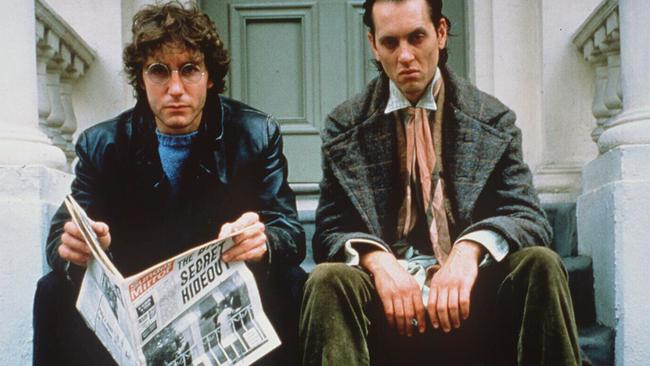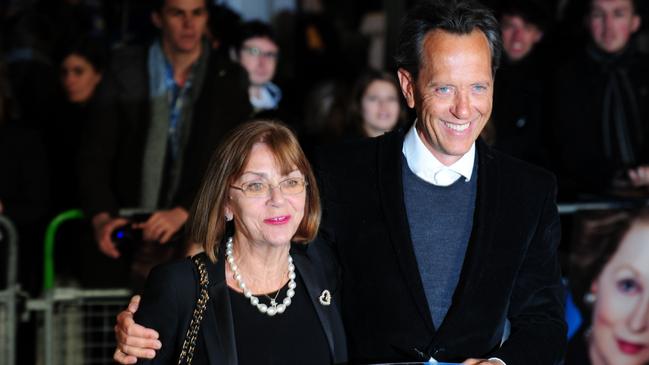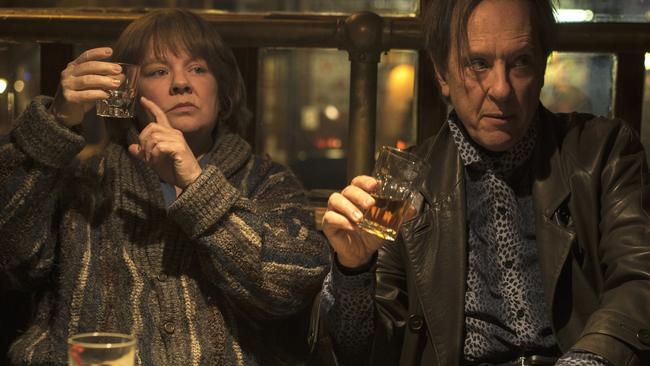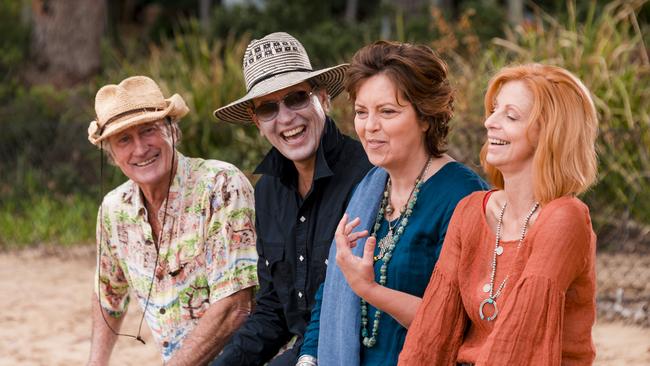How a new memoir and show helped Richard E. Grant cope with the grief of losing his wife
Acting veteran Richard E. Grant was bereft when he lost his wife of 35 years last year, but he reveals how her last wish set him on the path to healing.
SmartDaily
Don't miss out on the headlines from SmartDaily. Followed categories will be added to My News.
Actor Richard E. Grant admits he doesn’t really know exactly what to expect from his live shows in Australia later this year.
The versatile veteran is regular visitor to these shores, having played Professor Higgins in a 2008 Sydney production of My Fair Lady, filmed Kath and Kimderella in 2012, Palm Beach in 2019 and the 20,000 Leagues Under the Sea prequel Nautilus this year, to name just a few of his Aussie adventures.
He will return in November to talk about his long and varied career as well as his new memoir, A Pocketful of Happiness.
The first half of the show, he says, will be “me blathering on” with hilarious and candid tales from movies and TV shows including Withnail and I, Spice World, Doctor Who, Downton Abbey and his Oscar-nominated role in the 2018 drama, Can You Ever Forgive Me?
He will also recount his recent experiences with grief, having lost his wife of 35 years, voice coach Joan Washington, to cancer last year.
Before she died, Joan challenged him to find the “pocketful of happiness” every day that gives the heartfelt memoir its title.
The second half of the show, in which he will answer audience questions delivered by an app, is where things could get a little less predictable.

After sharing his experiences and feelings on social media since her death, Grant says he’s been approached in supermarkets and subways by strangers offering condolences and sharing thoughts of “the common denominator of what all of us unavoidably have to endure at some point in time”.
But he’s unsure just how he might deal with an outpouring of emotion on stage in front of an audience.
“Whether I will be completely undone by that, I don’t know,” he says.
“Because as you can tell, I’m not exactly good at hiding what I feel about anything. But that’s what an evening like this can be. I don’t intend it to be a sort of Oprah Winfrey cry-fest, where we all gather together in a great grieving, but if it turns out to be that, and that is the way that people want the evening to be, then who am I to say no?
“Members of the public will ask you stuff that is so left of field, and that is what provides humour and the fireworks of the evening, hopefully. And if they don’t ask anything, then we can go home sooner rather than later.”
Grant was wary of writing a memoir at such a raw moment in his life and initially knocked back approaches from publishers.
It was his daughter Olivia who helped change his mind, telling him she thought the very process of writing it would be cathartic, as it had been for so many other events in his life. Grant refused to take an advance until the book was completed and had been signed off by Olivia – she asked for just two changes in the entire manuscript.

Grant’s love of diarising stemmed from a traumatic event in his native Swaziland (now Eswatini) when, as a 10-year-old, he “inadvertently witnessed my mother’s adultery” with his father’s best friend.
Writing it down was the only way that he could make any sense of it when he couldn’t tell anyone else, and the practice has served him well in turbulent times since.
His first book, With Nails: The Film Diaries of Richard E. Grant, was full of tales about the absurdities and excesses of Hollywood, having been granted entry thanks to the cult success of his 1987 film debut, Withnail and I.
His second, The Wah-Wah Diaries, chronicled the rollercoaster ride of his first feature film as director, the semi-autobiographical comedy-drama Wah-Wah. Writing about Joan’s death and their long life together was similarly healing.
“During my wife’s illness, at the end of each day – from the diagnosis to her death eight months later, the second of September last year – I found it very helpful in that, in a moment where you have no control of somebody’s life deteriorating, literally in front of your eyes, that in writing about it somehow I thought ‘well, this will keep her alive on the page’,” he says.
“Then transposing that into an actual book proved to be exactly that thing that my daughter had predicted it would be.”

Grant says that Joan’s challenge to find the pocketful of happiness every day – the mantra is written on post-it notes on his computer keyboard, on his car dashboard and in his phone – is easier said than done amid the “tsunami of grief” that followed her death.
But he’s grateful that they had time to say all they wanted to say to each other and for her insistence that life – and joy – must go on for the family after she was gone.
“She said as a sort of clause to finding a pocketful of happiness in each day – ‘don’t feel guilt about being joyful or happy again after I’m gone because that is what I want’,” he says.
“So, in one phrase, she essentially gave us permission to celebrate her life and also to not feel that our lives had to stop because hers has. That is an extraordinarily – and typical of her – generous gift to have given us.”
Despite the bleak source of the memoir, Grant’s book and show will be anything but. He’s a fabulous raconteur and has accumulated a wealth of hilarious and revealing anecdotes from his decades in show business.
Even after 35 years, he says that Withnail and I – in which he played a boozy, self-obsessed, aspiring actor – is the film that’s most quoted back to him by new generations discovering its cult charms.
When this writer admits to being occasionally guilty of “wanting the finest wines available to humanity”, he gamely, if slightly wearily, joins in to finish the quote “and we want them here, and we want them now”.

“It’s astonishing to me, considering it has no plot, no special effects or any of the things that are supposed to make us hurtle to the popcorn movies,” he says of the film’s enduring appeal. “But I’m so grateful for it, because otherwise I know that I wouldn’t be talking to you here right now.”
In recent years, Grant has mixed up his character actor roles with appearances in some of the biggest pop culture franchises around, from Star Wars to Game of Thrones, and Doctor Who to the Marvel Cinematic Universe.
“You sort of get dropped in like a tea bag, to flavour up something, and then you get thrown out again,” he says, with a laugh. “You don’t stay for too long.”
He’s also at peace with the fact that he may never again scale the heights of his Oscar-nominated role opposite Melissa McCarthy in the 2018 drama Can You Ever Forgive Me? At the time he documented his extraordinary journey on the awards circuit on social media, recognising it as “the ride of a lifetime”.
“I got to meet every legend and every famous person and every young person or old person of real talent that I had ever hoped or expected to meet,” he says. “It was like being in Madame Tussauds, except that they were live, and what really astonished me is that so many of them said, ‘Oh, I saw your movie’ or ‘I saw you in that’. And that was that was the real kick of it. I’m forever grateful for that.”
A Pocketful of Happiness is released October 5.
An Evening With Richard E. Grant, Hamer Hall, Melbourne, Nov. 18; Sydney Opera House Concert Hall, Nov. 20; Her Majesty’s Theatre, Adelaide, Nov 21; Canberra Theatre Centre, Nov 23; QPAC Concert Hall, Brisbane, Nov. 28. Tickets RichardEGrantLive.com
Originally published as How a new memoir and show helped Richard E. Grant cope with the grief of losing his wife




